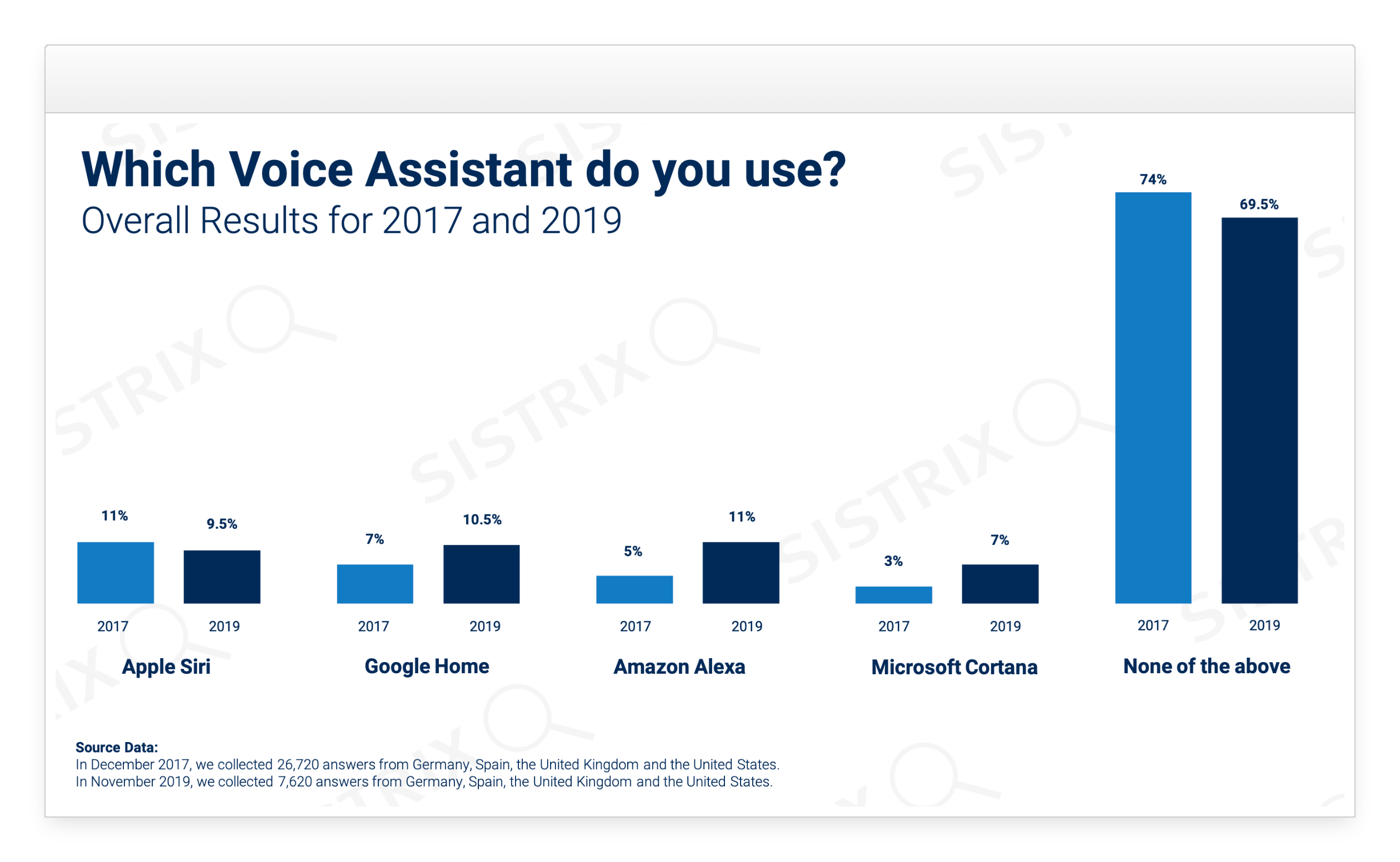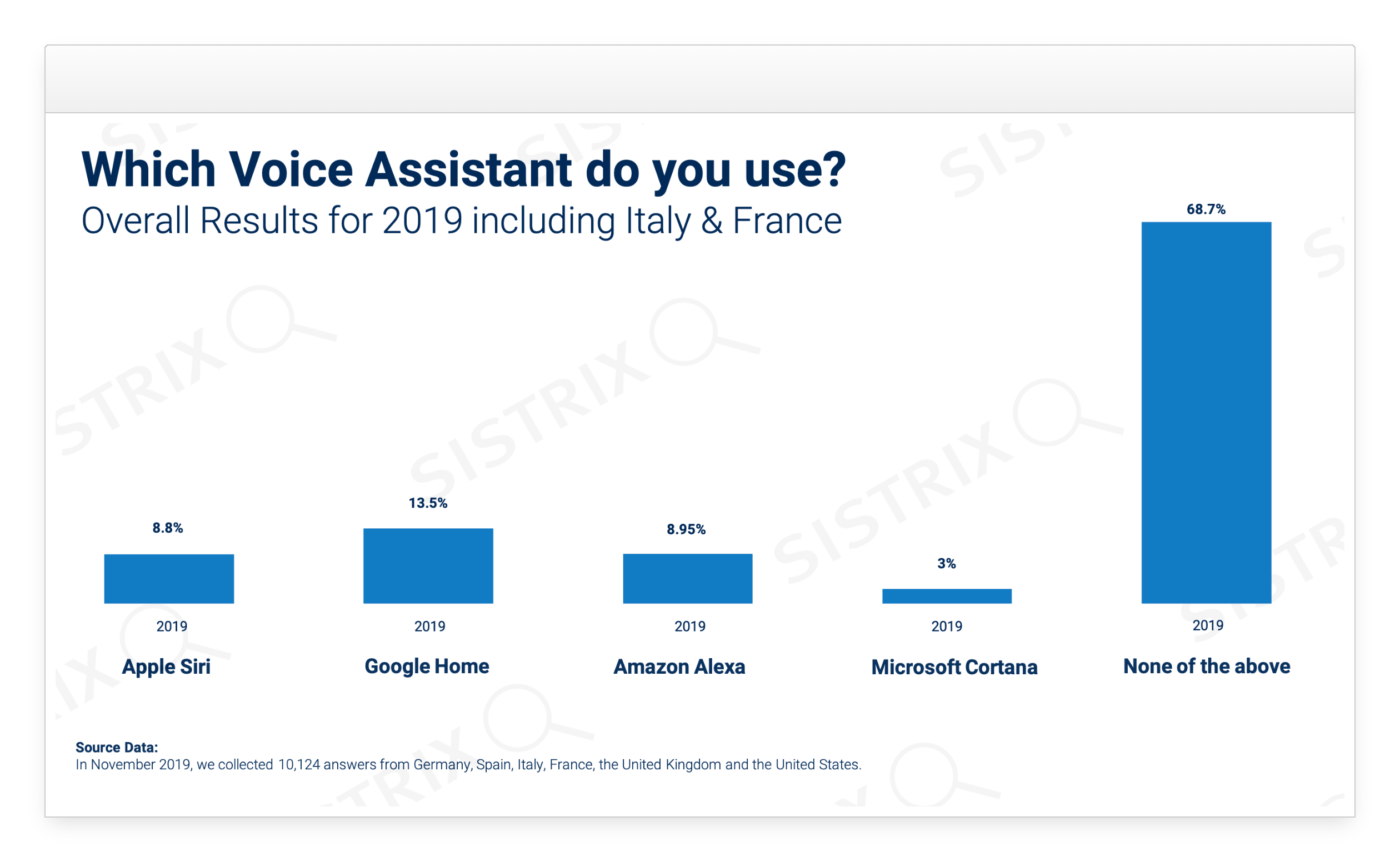Voice Search isn’t changing SEO. All the ‘optimise for voice’ recommendations are questionable and in many cases, if not all, you can ignore them. Most of the information is misleading, uses the wrong data, the wrong sources and is even presented by sources that are confused about what Voice Search is. Despite this, the misinformation still spreads.
What is Voice Search?
When someone talks about Voice Search, the first thing that comes to mind for many people are smart speakers like Google Home, Amazon Alexa, Siri from Apple and Cortana from Microsoft and how to optimise websites for them. Actually, they are not really relevant for SEO purposes, for one reason:
The output makes all the difference when you are talking about Voice Search:
- When users are using spoken voice commands, rather than typing for search on Google, this is a normal web search on Google (SEO as usual). These searches are logged on Google Search Console so, you can see them.1
- When users are using spoken voice commands to get spoken answers, this is something different and has almost no relation to the business of SEO. Those searches are not logged on Google Search Console.1
If the first output is growing, the game stays the same for SEOs. If the second output is growing, you can stop your career as SEO or Webmaster and start creating innovative and original “skills” for smart speakers (and make people aware that they exist, of course).
For Google, voice search is more than classic search queries on a web index, as we know it.
“Voice Search” was a tool from Google Labs created in 20073. Google brought similar products to the iPhone, BlackBerry and Nokia in 2008, which made it possible to do a Google web, Google Map or YouTube search using only your voice4. In 2012, Google introduced Google Voice Search for desktop PC and mobile phones and since July, 2019, they are all included in Android as the “Google Assistant”5.
SEOs should know that, for Google, “Call X“, “Send Y a text message” or “Set the alarm to 6 o’clock“ are considered in their statistics for voice search queries – they are “Device Actions” to be precise, according to Google’s own Quality Rater Guidelines2.
Where did all those big predictions come from?
When Sundar Pichai announced, at Google I/O in 2016, that 20% of all US searches are voice queries, he was including all these Do-Device Actions with the Google app and on Android (classical search included). 6
It is interesting that in 3 ½ years, Google hasn’t released any further statistics, which leads us to suspect that the use of voice search hasn’t grown as significantly as many have predicted. So where does the most popular prediction come from?
“By 2020, 50% of all searches will be conducted via voice”.
When I started this research, the first thing that caught my eye were the number of sources referring to other sources, that are, in turn referring to other sources that finally reference ComScore.
In simple words this is like, “I know someone who knows someone who knows the person who said that.” But on ComScore’s study “The Future of Voice”, Susan Engleson never mentions a statistic like that.7
It was Mary Meeker from Kleiner Perkins (an internet analyst) on their popular “Internet Trends Report”.8 The funny thing is, she was simply quoting the Chief Scientist of Baidu, Andrew Ng, who said that in an interview with Thefastcompany.com, in 2014:
“In five years time at least 50% of all searches are going to be either through images or speech”.9
This is the conclusion at which Rebecca Sentance also arrived, in her evaluation into the matter last year. (Her Twitter account is linked below. Now would be a good time to follow her!)16
Why Andrew said 50%, is still unknown, but now we know, he wasn’t right at all (Baidu isn’t even market leader for voice search in China today. But this is another story10).
In the same way as Andrew, the analysts at Gartner, felt they needed to say something11. They ventured to give a random number on their Strategic Predictions for 2017:
“By 2020, 30% of web browsing sessions will be done without a screen.”
Ironically, the name of the analyst making the prediction is still missing, but not the source that was used. The source for the analysis was Google’s article, “OMG! Mobile voice survey reveals teens love to talk“ from 2014, where you won’t find percentages of voice search users, they just examined the smartphone voice search habits of the current voice search users.12
At least at Gartner, they are honest, they recognize on their report that their “assumptions are provocative.”
In addition to this number inflation, no analyst or author carefully distinguishes between smartphone and smart speaker use cases, and no one has explained Google’s perspective about voice search. All this is relevant for SEOs.
Transparency please – Isn’t it much easier to simply ask the people?
In December 2017, we used Google Surveys to collect 26,720 answers from Germany, Spain, the United Kingdom and the United States 13. We repeated the same survey to collect 7,620 answers from Germany, Spain, the United Kingdom and the United States on 16. November, 2019. Here there is the overall result:

We also asked, “What do you use to activate your voice assistant? a) “hey, Siri”, b) “hey, Alexa”, c) “OK, Google”, d) “hey, Cortana”, in order to make a difference between having a device / app, and using it. We got similar results.
BTW: In the USA, Apple Siri is leading while in Europe Alexa is in the lead (except for in France). Google Home has grown in both. In the US 65% are using at least one voice assistant.
There’s one simple message here – the use of voice search doesn’t seem to have grown significantly.
Last Thoughts
- Voice Search is the future but there is no revolution on the way. However, even if that were the case, if you have a website configured such that the information is easily accessible and useful for users as well for search engines, then you don’t need to do anything special for voice.
- Don’t trust the forecaster. I will never understand why forecasters didn’t predicted the rise of Amazon, Google, Apple and Facebook, thus allowing them to quit their job as an analyst! Using a broken clock I can predict the time twice every single day, the rest of the time I’ll still be wrong. That’s what forecasters do. But a scientist would say: There’s is a 1% probability that Voice Search can grow 30% in 2020, and this is why she prefers to do science and not to buy shares of emerging companies.
- Use Google Surveys.14 You don’t necessarily have to rely on what other people are saying, you can get reliable data using Google Surveys today. We spent 139 Euros for more than 1500 answers per country. I personally believe it’s even better method because people don’t lie to machines.15
I hope you like it.
PS: We also conducted the survey including France and Italy, in case we have to repeat the study again, in another 2 years :)

Sources
- 1AskGoogleWebmasters – YouTube
- 2https://static.googleusercontent.com/media/guidelines.raterhub.com/en//searchqualityevaluatorguidelines.pdf
- 3 https://searchengineland.com/google-cuts-the-cord-on-goog-411-52592
- 4 https://googlemobile.blogspot.com/2008/11/google-mobile-app-for-iphone-now-with.html
- 5 https://searchengineland.com/google-swaps-voice-search-on-android-for-google-assistant-319986
- 6 https://www.thinkwithgoogle.com/data/google-app-voice-search/
- 7 https://www.comscore.com/Insights/Presentations-and-Whitepapers/2017/The-Future-of-Voice-From-Smartphones-to-Smart-Speakers-to-Smart-Homes
- 8 https://www.searchenginewatch.com/2016/06/03/what-does-meekers-internet-trends-report-tell-us-about-voice-search/
- 9 https://www.fastcompany.com/3035721/baidu-is-taking-search-out-of-text-era-and-taking-on-google-with-deep-learnin
- 10https://en.wikipedia.org/wiki/Sogou#Sogou_Voice_Recognition_Technology
- 11https://www.gartner.com/binaries/content/assets/events/keywords/cio/ciode5/top_strategic_predictions_fo_315910.pdf
- 12 https://www.blog.google/products/search/omg-mobile-voice-survey-reveals-teens/
- 13 https://www.sistrix.com/blog/stepping-out-of-the-seo-bubble/
- 14https://marketingplatform.google.com/intl/en/about/surveys/benefits/
- 15 https://www.amazon.de/Everybody-Lies-Internet-Really-Reveals/dp/0062390856
- 16Rebecca Sentance: https://econsultancy.com/the-future-of-voice-search-2020-and-beyond/ and https://twitter.com/rainbowbex
